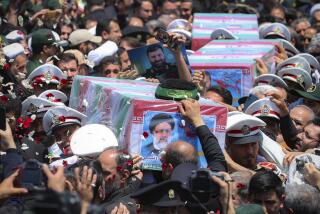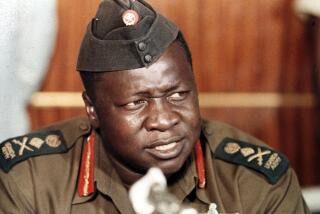Last of the Great Third World Leaders, Khomeini Tore Down Better Than He Built
- Share via
Few people in recent history have been at once as respected, revered, reviled and despised as the Ayatollah Ruhollah Khomeini.
To his supporters in Iran, Khomeini was the uncompromising and principled leader who for years single-handedly opposed the Shah, even when the monarch was at the height of his power and influence. The ayatollah then stood up to the superpowers and their pressures, fought a lonely battle against Iraq, and--although he did not win that war--pulled Iran back from the brink of disaster.
To his opponents, Khomeini was a tyrannical, obscurantist old man, driven by a religious vision, who cared nothing for Iran and its interests, bankrupted the country, sacrificed its youth and brought dishonor and shame upon it in the community of nations.
To his followers in the Islamic world, he was the Mahdi who was destined to restore Islam’s honor and to free the Muslim peoples from the dominance of infidel foreign cultures.
To his detractors, he was a fanatical xenophobe whose Shia-Persian origins made him irrelevant to the vast majority of Muslims and whose extremism brought disrepute upon them all.
In reality, Ayatollah Ruhollah Khomeini was the last of the great Third World leaders, in the category of Mao Tse-tung, Gamal Abdul Nasser and Kwame Nkrumah. He personified, and gave expression to, deeply felt grievances and aspirations shared not only by many Iranians and Muslims, but also by others in the post-colonial world.
Yet, like these predecessors, Khomeini was better at identifying ills than at finding cures for them, at destroying faulty structures than at building new and strong ones. The single-mindedness and commitment to a vision, which had enabled him to become the leader and focus of a mass movement against the Shah, turned into rigidity and fanaticism, bringing great misery to his people. Like Mao, whose revolution and image were stained by the excesses of the Cultural Revolution, and like Nasser, who became mired in the quicksands of the Yemen civil war, Khomeini’s revolution lost its soul and elan both in domestic repression and in the marshes of the Shatt al Arab.
Whatever form Iranian politics take in the future, Khomeinism, as the world has witnessed it during the last decade, will not survive Khomeini. The inadequacy of his political blueprint for governing Iran and for coping with the modern world had already become evident during his lifetime. The constitutional reforms that will be put to referendum this August are a direct result of this realization. Any government that is established in Iran, even one based on the current clerical leadership, must put more emphasis on professionalism and statesmanship than on zealotry.
In order to gain and maintain the support of most Iranians, their leaders must put the interests of Iran and its people above the pursuit of elusive ideological goals. This means according priority to rebuilding Iran’s shattered economy, to restoring its honor and standing, and to returning it to the mainstream of international life. Iran’s leaders must engage in a great act of healing at home; in particular, they must try to end the dichotomy between Islam and nationalism that has been at the heart of a generation of turmoil and suffering. Failure to do so could lead Iran to self-destruct politically and openthe country to manipulation by its external enemies.
It is not at all clear whether the current regime can transform itself into such a government and achieve these goals, or whether it will be destroyed by its internal divisions and contradictions. But the Islamic leaders’ instinct for preserving both themselves and the regime should not be underestimated. They are well aware of the threat posed by infighting. And they can take some comfort in the fact that the opposition is divided and lacks a single recognized leader able to provide a promising vision and alternative.
Whatever the future may hold for Iran, two things are certain: An era in its millenarian history has come to an end, and it is entering a new and uncertain stage of social and political evolution. In the process, little of Khomeini will remain, other than one element of his vision from the early days of the revolution: the common Iranian and Muslim desire for independence and dignity, whatever the attitude of the outside world.
More to Read
Sign up for Essential California
The most important California stories and recommendations in your inbox every morning.
You may occasionally receive promotional content from the Los Angeles Times.













